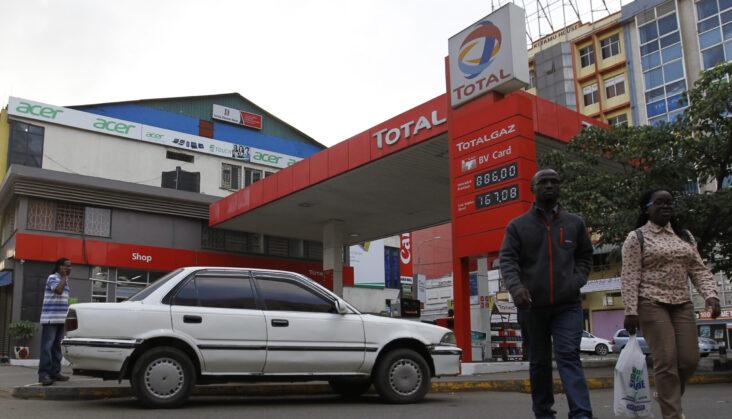Africa-Press – Lesotho. This follows similar moves from BP, which announced this week that they would be cutting oil and gas production by 40% over the next decade and increasing renewables investment ten fold. However, Total is aggressively pursuing plans to build a new oil pipeline across Uganda and Tanzania that threatens Africa’s future.
One of the most important victories for Africa that emerged from the negotiations that produced the Paris climate accord was the agreement that countries would strive to limit global heating to below 1.5°C.
Climate-vulnerable countries, including those in Africa, fought for this lower, more ambitious figure, rather than the previous 2°C, because their people in particular cannot risk the climate impacts associated with a 2°C-hotter world.
So it is disturbing to see that it could be new African oil, aided and abetted by fossil fuel giant Total, that ultimately sees global temperatures breaching the 1.5°C guardrail.
The French company is currently seeking permission to build a vast oil pipeline that would snake across East Africa in a bid to get oil from oilfields in Uganda, and later the Democratic Republic of Congo and South Sudan, to the Indian Ocean and then off to refineries.
A recent letter from NGOs to the African Development Bank pointed out that “the reserves in currently operating oil and gas fields alone, even with no coal, would take the world beyond 1.5°C” of heating.
To hit the 1.5°C goal, we need to be reducing fossil fuel emissions by at least 6% a year. That means keeping more of it in the ground, not building pipelines to new oilfields.
The carbon footprint of the oil from the pipeline, once burned, is estimated to be the size of Denmark. The 1.5°C Paris agreement goal may have been fought for the self-preservation of vulnerable people in Africa, but it’s ultimately for the benefit of the whole world.
The difference between keeping temperature rise to 1.5°C rather than 2°C is too long to list here but includes 9% of the world’s population, rather than 28%, suffering from extreme heatwaves and losing 70% of coral reefs rather than virtually all.
And it’s also the risk that we tip into irreversible climate disruption that is beyond our control. But it’s not just the existential threat of climate change that makes the pipeline a terrible act, it’s also bad economics.
Due to the coronavirus, we may actually be living through peak oil. The combination of the economic downturn and the recent price war between major producers means it is highly possible global oil consumption may never recover.
Last month saw Shell write off $22bn in fossil fuel assets, while BP wrote off $17.5bn. BP says it believes the price of oil to now remain a third lower than expected for decades to come and its CEO Bernard Looney said: “I don’t think we know how this is going to play out.
I certainly don’t know. Could it be peak oil? Possibly. I would not write that off. ”
Now is clearly a terrible time to be building a massive new oil pipeline across East Africa that could become uneconomic within a few years.
One of Africa’s great strategic advantages is that it is not encumbered with outdated fossil fuel infrastructure and can instead leapfrog that dirty energy and move straight to clean, cheap, solar and wind, with which Africa is blessed in abundance.
Africa’s climate allies are already showing the way. Sweden is aiming to eliminate fossil fuels from electricity generation by 2040 and Costa Rica has produced 95% of its electricity from hydro, geothermal, solar and wind over the past four years and aims to be entirely carbon-neutral by 2021.
This is the direction Africa should be going in, but oil giants like Total are desperate to exploit African oilfields, even if Africans are going to suffer the climate consequences.
The East African Crude Oil Pipeline is aptly named, with the proposed route crossing more than 200 rivers and thousands of farms, cutting an ugly path through vital lion, elephant and chimpanzee habitats.
Despite Total claiming to have consulted widely with communities, NGO colleagues on the ground complain that this has been merely a box-ticking exercise with painfully short deadlines for feedback on the proposals.
France has a shameful colonial past when it comes to Africa, one that President Emmanuel Macron described as a ‘crime against humanity’. And yet here we are in 2020 with a French oil firm desperately pushing through a major fossil fuel project so it can profit even more from the climate suffering of Africans.
Ultimately if the world breaches the 1.5°C goal, it will not be Africa’s fault. We make up 17% of the world’s population and have generated only 4% of global emissions.
The fault will lie with the politicians and companies of the global North. Instead of helping Africa develop along clean energy pathways, they are greedily shackling us to a dirty fossil fuel future with dire climate consequences for us all.
For More News And Analysis About Lesotho Follow Africa-Press






